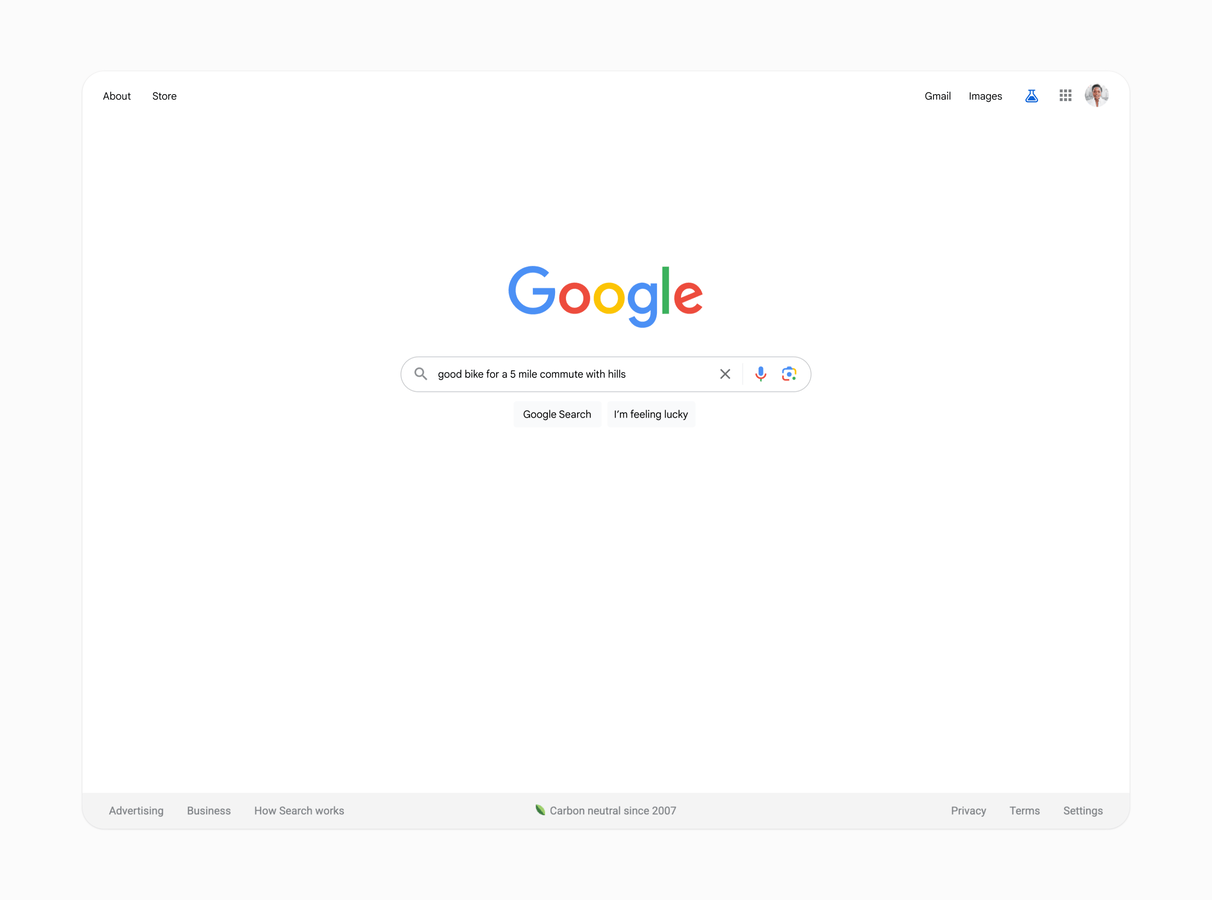Google’s Search Generative Experience (SGE) is changing the way ecommerce sites think about organic search. With the introduction of SGE, product listings are aggregated and displayed to users based on how well they align to the search. This means that you aren’t necessarily setting your own product information, Google is.
Ecommerce sites have control over how product listings are presented and are able to refine those experiences based on their analysis of the user journey. With SGE, product listing control will be shifted. With AI-generated summaries and comparisons appearing directly in search results, your products will be up against others like never before. This experience is going to drive competition through the roof.
Looking to refresh your Ecommerce SEO strategy?
On the flip side, SGE could play a role in increasing your qualified traffic, improving user experience, CTR and conversion rate. If users are able to pre qualify a product using SGE, in theory, any click through to your site would be increasingly motivated to purchase. The obvious down-side is that you have to compete with other companies for a small portion of product real estate.
Generative search advancements for shopping are a serious evolution for online purchases. The truth of the matter is, businesses will have to adapt. It’s a fact that Google still accounts for the majority of search and as more shopping is done online and ad space becomes limited, more and more businesses will rely on organic search. If you can get ahead of this shift, you’re likely to have less competition and more stable evergreen listings. Let’s talk about the benefits ecommerce sites should focus on with this shift in search.
How Ecommerce Can Take Advantage of SGE
With SGE on the way to a full rollout, Ecommerce focused sites are wondering exactly how these changes will affect their industry. The main theme that all businesses should keep in mind is that user experience is going to help higher than SEO where Google cares more about how users interact with content and search results.
While many may look at these changes as a risk, if properly understood, businesses can understand, plan, and mitigate these risks by taking the proper steps. Here are some of the advantages of the rollout of SGE:
1. Enhanced User Experience
Imagine you’re shopping for a new gaming headset. You might type in “gaming headset” and be met with a long list of product results. For many, this can be overwhelming and not offer a clear path for narrowing down your options. Instead of showing a traditional list, SGE will provide:
- Key Feature Summary: SGE will provide you with an overview of additional factors that might affect your search so you can narrow down your options. This not only provides a better result for users without ever leaving the SERP, but it aligns products to the user prior to website visit.
- Personalized Recommendations: Using the information from your recent searches and browser history, SGE might provide options more tailored to what you’re already familiar with. This is important for those writing blog content about key pain points or product benefits. Having users land on your site for related search will influence their shopping decisions.
- Side-by-Side Product Comparison: You will be able to seamlessly compare products based on your needs directly within the SERP. Depending on product specifications, you may find some information is more valuable than others on your product pages. Knowing what Google plans to show for your industry products can give you a clue to what you may need to highlight.
2. Improved Click-Through-Rates
When you get a more comprehensive search result, you will get a higher percentage of click-through, as long as you’re properly positioned. On the flip side, if you’re not in the top spot, this could dramatically drive down the number of searchers clicking through to your result.
When users are met with the high-quality and informative results of SGE, you’re simultaneously using Google’s platform to build trust among users. When users see your listings in AI summarizes and suggestions, they will associate your brand with top-rated results. When you appear more reliable and trustworthy, users are more inclined to give your site a chance and click through.
3. Increased Conversion
The concept of pre qualification isn’t just important for CTR, it can also play a role once users get to your site. If a user is already trusting of your product due to it’s real estate listing within Google, they’re going to be more likely to buy.
With the additional information available in the SERP, customers have to do less follow-up searches that take them away from their purchase decision. Users will be better equipped to make decisions, which, based on your location in SGE, could have a significant impact.
Potential Impact & Challenges For Ecommerce
1. Reduced Organic Traffic
It’s obvious that SGE will impact organic traffic numbers for almost all sites. SGE takes up a lot more space than your traditional featured snippet. With more and more searchers turning on SGE, we’re likely to see a big shift in search behavior where less people are clicking through to websites to learn more. Searchers are likely feeling that they have most of the information they need to make a decision and move forward.
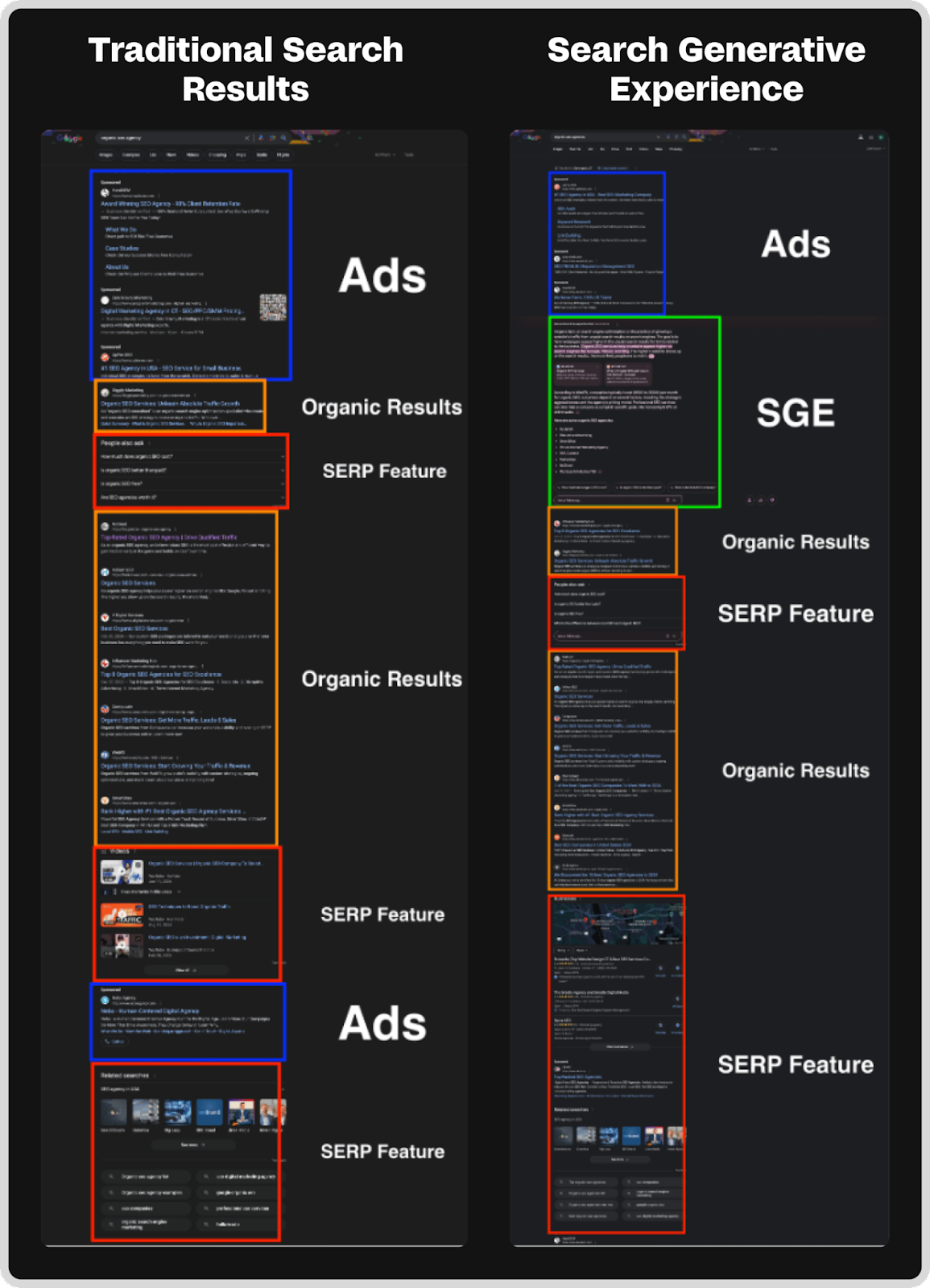
2. Competition Within SGE Results
SGE might display information and product listings from other retailers alongside yours. Getting to that number one slot will still be the goal but the path to get there will be different. Competing with other organic results will have a new definition.
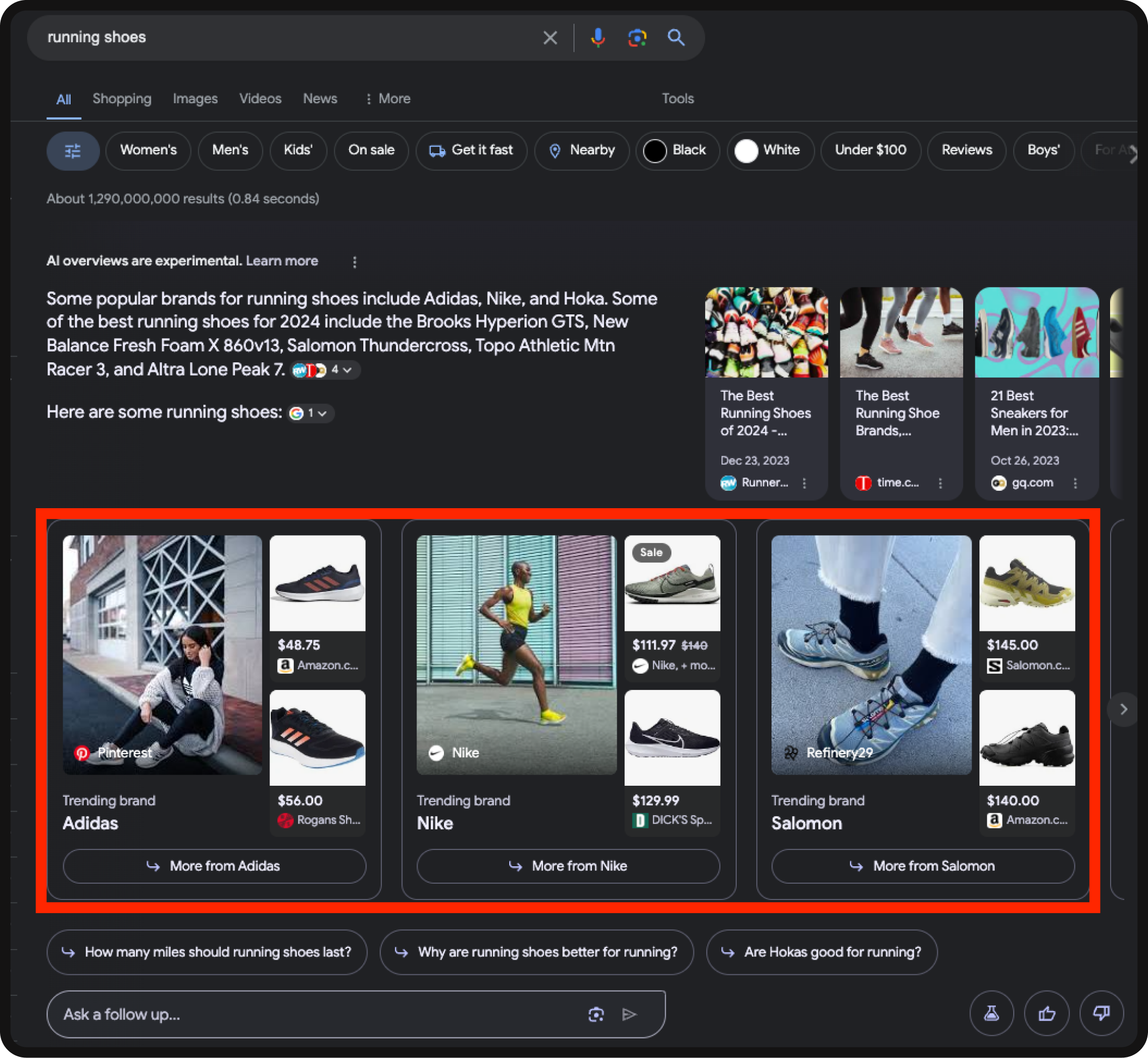
This is going to drive the need for structured data on product pages. Structured data will make it easy to lift important information to be paired with your listings.
3. Shifting Reliance on SEO
Search is changing and it’s changing big with the introduction of SGE. The generative experience is attempting to solve the user’s needs within one search. Google is prioritizing a broader understanding of user intent. With a shift to a broader sense of search, SEOs and marketer’s are going to have to re-think and shift their efforts to adapt beyond the normal content and keywords.
Speciality activities will have to take place in order to move the shopping needle. If users are finding what they need with SGE, ranking highly in organic search will have less of an incentive.
4. Loss of Brand Control
Brands will have less direct influence when it comes to their search visibility. With SGE surviving curated information, Google will make decisions on what brands, listings and product options are shown in their summary. The criteria for these listings is related to previous standards but with this new format, the rules are likely to change. Two big themes impacting brands are:
- Limited Messaging Control: SGE aggregates information to present a more streamlined result for the user. When Google is making these decisions the information it provides along with your listing might not be directly editable or relevant to your result. Changing this information could take time as Google will need to recrawl the source.
- Reviews & Competitor Presence: Be mindful of negative reviews and your responses toward them. You’ll need to be on top of these elements as they will likely show alongside your product listings. If you have a recent negative review, this could be displayed to new customers.
How To Prepare & Take Action For Your E-Commerce Site
Preparation is the name of the game when it comes to Google updates. Oftentimes those who ignore these warnings are the ones who fall behind. If you’re ahead of the game you’ve probably already started to think about the key things you need to be putting in place to eliminate fluctuations in organic traffic and revenue. Three key things every ecommerce site should be thinking about ahead of time is investing in content creation, optimizing structured data, and incorporating more reviews and social proof.
1. Invest In Educational & User Friendly Content
We have to move beyond the boilerplate product descriptions. Ecommerce sites need to be investing in content that educates and hooks customers. Frame your product pages and blog content around the pain points and product benefits historical customers have converted highly on.
Buying guides and informational product blogs will help your site generate some related organic traffic. As customers visit your site, their shopping experience should favor your results as Google knows that the user has visited your site before based on browser history.
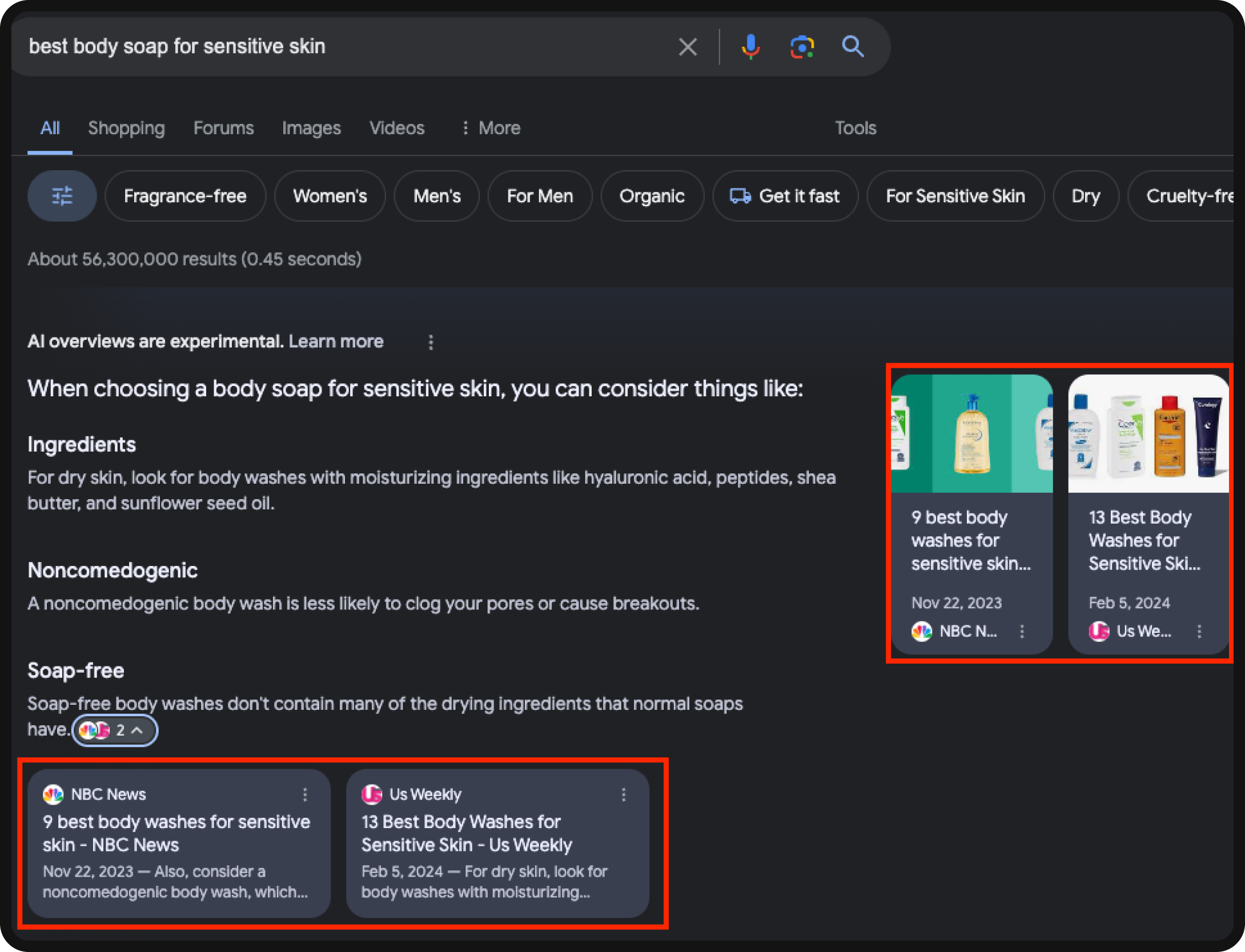
2. Optimize Structured Data/Product Schema
Product page structured data is a MUST. Google is going to be using this information to structure and rank your pages alongside others competing for SGE space. Ecommerce sites need to invest in optimizing their structured data/schema to be competitive in the future of search. This data is crucial for Google and users to understand more about your product at face value as they view it in SERP.
3. Prioritize Reviews
Reviews are also going to play an important role in how products are displayed. Reviews have long benefited products and businesses listing and this will continue to be a trend as search evolves. Prioritize and integrate reviews into your marketing efforts. Reviews, to Google, are like a backlink from a happy customer. Showing a commitment to customer feedback and responsiveness will accelerate product page listing growth.
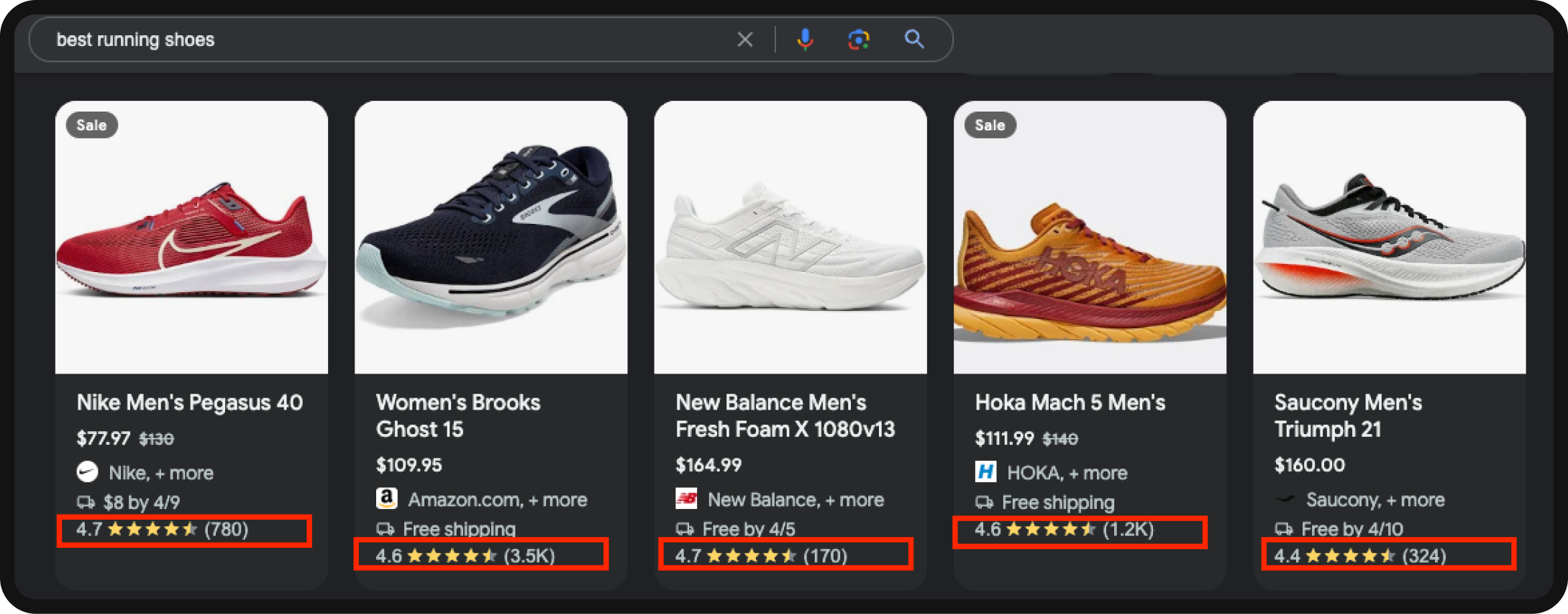
Don’t Tackle SGE Alone
Generative search is about to revolutionize the shopping experience for Google searchers. It should be clear that if users favor the SGE results, product page traffic and CTR for any other results will see a negative impact. If you are focused on preserving or growing your product listing visibility in search results, you need to take action yesterday.
If you’re trying to get set up and rolling fast, we’re NoGood for that.

